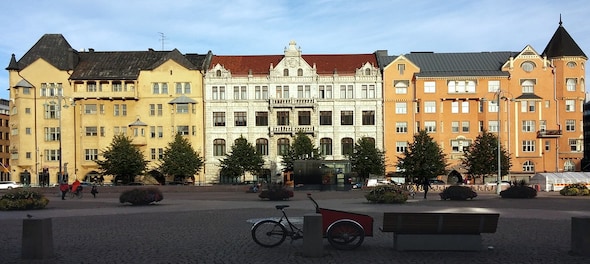
Strolling down the streets of Helsinki, it’s easy to see why the Nordic city has become the go-to for design aficionados from across the globe. Storefronts across the Finnish capital are dotted with sleek furniture, colourful vintage clothing, antiques, and paintings by local and international artists. In Finland, design and art are not the prerogative of the wealthy elite, but inclusive, unifying media of expression that permeate every aspect of life. Nowhere is this more apparent than its Design District, which is home to some of the finest boutiques, museums and galleries in Northern Europe. And while there are a number of unique concept stores and eye-catching window displays along the city centre, the one that piqued my curiosity the most was Tikau.
It would be a gross understatement to say that the Hindi word for ‘long-lasting’ was the last thing I expected to see on a storefront in Helsinki. Yet, there it was, adorning a shop whose products seemed decidedly European. A foray into the store, however, makes it evident that Tikau is not only the business’ name, but also its ethos.
Employing over 120 artisans from rural India, Tikau showcases the sleekness and minimalism of Scandinavian design using Indian craftsmanship and aesthetic sensibilities. A closer look at the products shows slight deviations between items, declaring a marked shift away from the uniformity that mass-produced goods offer. From home décor to clothing and accessories, each item sold by the brand is hand-crafted, and built with the aim to empower with design. It only seems natural, then, that the goods are also crafted with eco-friendly raw materials like bamboo, organic cotton, banana fibre and non-dyed wool.
So, how did this business in Northern Europe become a source of gainful employment for Indian artisans? The journey started nearly a decade ago, during founder Taina Snellman’s stint in rural India. “I wanted to help. If I had been a doctor I would have done something else perhaps, but my background was in design and clothing,” she said. “I realised that maybe design could provide a way for me to help. The natural connection between design and employment was to combine design with handicrafts.”
And thus was born Tikau, based on the Design Helps ideology, which seeks to boost global well-being by combining trade with aid. Meanwhile, Tikau Share, the NGO that the company operates in India, works to empower the economically and socially disadvantaged Dalit community in Odisha. Their efforts include – but are not limited to – increasing the standard of living, self-sufficiency and literacy of the community.
Beyond the big gestures, though, it’s the small considerations that further drive home the impact of Tikau’s work. For instance, one of the reasons Snellman believed in the power of handicrafts as harbingers of empowerment and development is the fact that it brings employment closer to people, instead of the other way round. Combine this with the fact that the work does not require any electricity, and that the mobility allows women to partake in it as well, and it’s hard to deny the inclusive power of design. And if there’s one thing that’s even more obvious, it’s that expanding our concept of ‘helping’ to include unconventional things (like design, in Tikau’s case) can be instrumental in effecting tangible, lasting change on the world.
First Published: Sept 13, 2019 6:00 AM IST
Check out our in-depth Market Coverage, Business News & get real-time Stock Market Updates on CNBC-TV18. Also, Watch our channels CNBC-TV18, CNBC Awaaz and CNBC Bajar Live on-the-go!


Telangana CM violated poll code, defer Rythu Bharosa payment, says Election Commission
May 7, 2024 9:01 PM
Lok Sabha Election 2024: How Indian political parties are leveraging AI
May 7, 2024 6:59 PM

